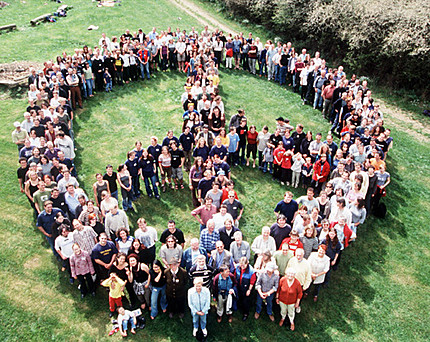Int'l Day of Peace brings important reminders
- By Eugene Clark
 0 Comment(s)
0 Comment(s) Print
Print E-mail China.org.cn, September 26, 2013
E-mail China.org.cn, September 26, 2013
September 21 is the International Day of Peace, sometimes also referred to as World Peace Day. The day celebrates world peace in general and, more specifically, the absence of war and violence.

The world has experienced a relatively peaceful six-plus decades since the end of WWII, and over two decades since the end of the Cold War -- a term coined by English journalist and novelist George Orwell. The Cold War scenario was foreseen by HG Wells. This new type of war referred to the standoff between two major powers, each possessing weapons that could potentially destroy the world and fighting various proxy battles to gain more global influence.
I am old enough to remember the 1961 Cuban Missile Crisis. My family at the time lived in Fort Lauderdale, Florida, just 90 miles away from Cuba. I was in Grade 8 and with the news that Russian ships were steaming full ahead towards the U.S. naval blockade there were realistic fears that all would end in a nuclear war. I can still remember the fear in my parents' voices that morning, as they discussed whether it would be safe to send me and my siblings to school.
During these relatively peaceful times, it can be easy to forget that those same weapons that threatened a nuclear war back then still exist now - and in fact, more countries than ever before now possess them. The celebration of World Peace Day and the continuing threat of nuclear weapons are important reminders of the fragility of human life on this increasingly crowded, competitive and inter-connected planet that we all share.
Peace does not come easy. All countries have to work hard at it and the task begins with creating a greater awareness and understanding of others. As Nobel Peace Prize winner Dr. Martin Luther King stated, "Peace is not merely a distant goal we seek, but a means by which we arrive at that goal." The work of the United Nations today in preventing war is without a doubt its most important mission.
Also important are the events which occurred this month, all of which sought to promote the peaceful resolution of disputes. These include the SCO Meetings, the China Arab States Expo and President Xi Jinping's pronouncements about helping to resolve the Iranian nuclear and Syrian chemical weapons issues.
Mahatma Gandhi once noted, "If we are to teach real peace in this world, and if we are to carry on a real war against war, we shall have to begin with the children." I fear that children today do not seem to read and learn about history as much as they used to. On the positive side, I am pleased to see that President Xi and people like Bill Gates worry about history as well. Xi has often spoken of the so-called China Dream and sees it as a continuation of China's great achievements over its thousands of years of history.
Professor David Christian's Big History Project, supported by Bill Gates, looks at an even bigger picture than just the 5000 years of recorded history. Christian focuses on the study of humanity within the larger context of the 13.8 billion years that have passed since the Big Bang. The goal of his project is to encourage students to, in Christian's words, "Ask the big questions about our universe, our planet, life and humanity. Explore where we are going in the future and challenge students to develop the skills and knowledge they need to get there."
Peace is not just something that occurs among nations, but also within countries, within families and between individuals. World Peace Day should remind us of the importance of putting an end to violence and working hard to resolve differences through peaceful means such as dialogue and adherence to the rule of law.
Peace is about harmony and that includes being in harmony with, as opposed to destroying, our environment.
Finally then, there is the importance of inner peace and contentment. As 17th century British politician and author Joseph Addison noted, 'A contented mind is the greatest blessing a man can enjoy in this world." That contentment only comes when we distinguish our needs from our wants; and its wellspring will derive from a sense of gratitude and not taking things for granted.
The author is a columnist with China.org.cn. For more information please visit:
http://www.china.org.cn/opinion/eugeneclark.htm
Opinion articles reflect the views of their authors, not necessarily those of China.org.cn.






Go to Forum >>0 Comment(s)